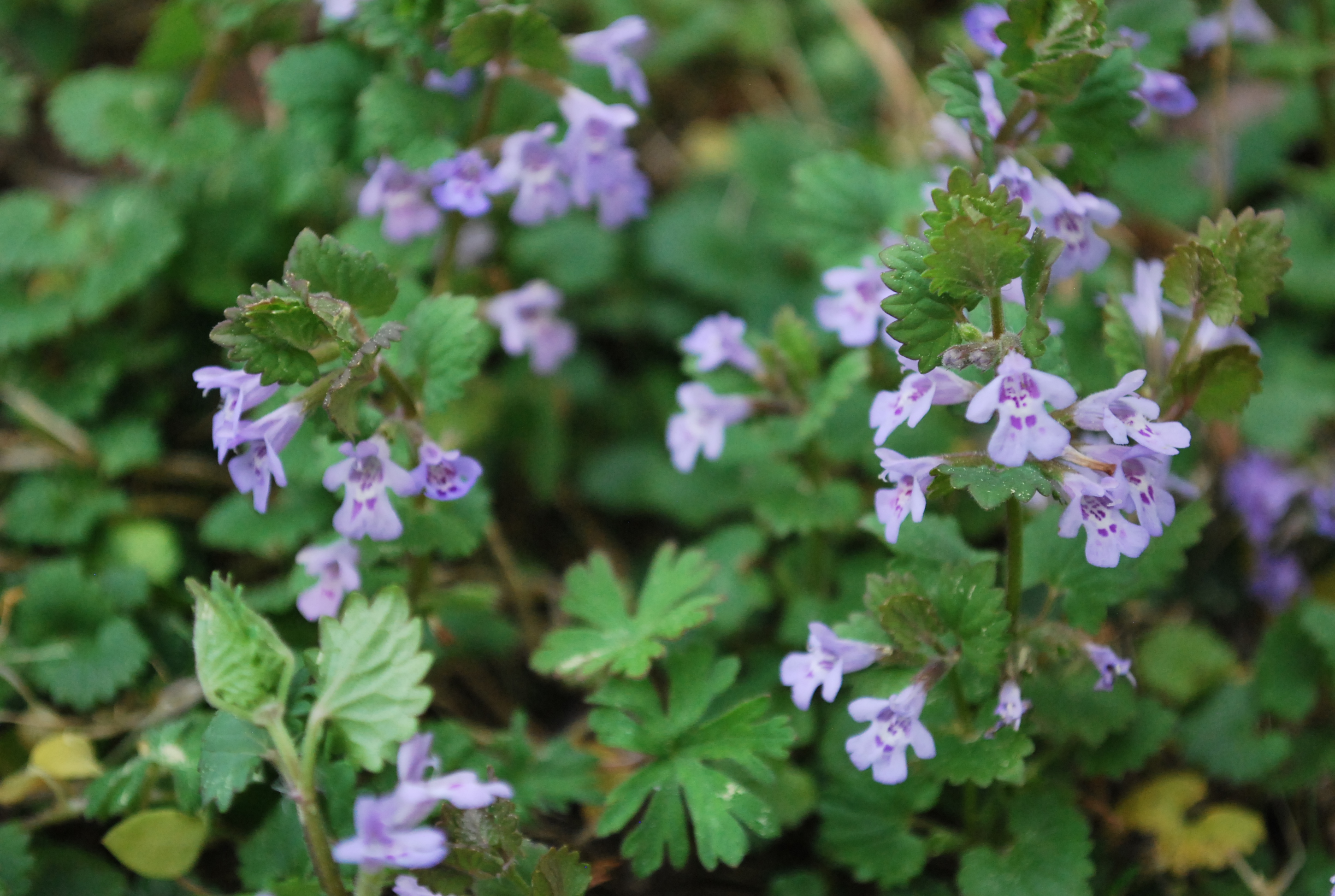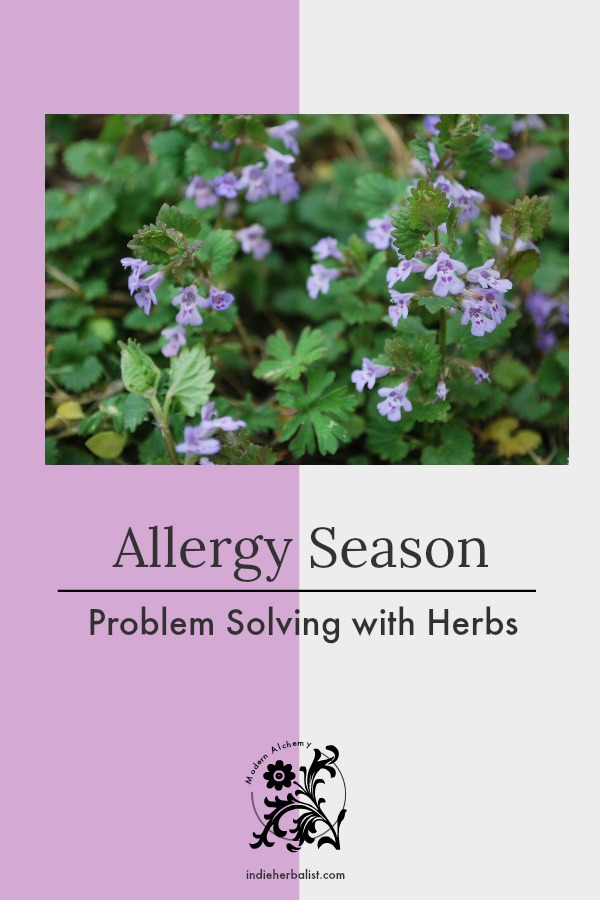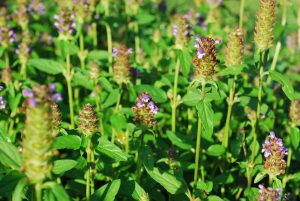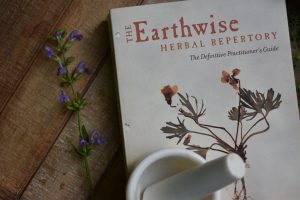Links contained in this post and elsewhere on my website may include affiliate links. When you make a purchase through these links, I earn a commission at no additional cost to you. I only link to products and services that I love - and that I think you will love, too!
It’s easy to find lists of herbs for allergy season. Unfortunately, these lists generally miss the mark by focusing on a few generalized suggestions. Nettles, garlic, and turmeric are some of the most common candidates.

However, there’s a much more effective way to approach allergy season with herbs. Many different body processes have a role in how our bodies respond to allergens. Examining three, in particular, can make working with herbs for allergies more effective. These are:
- stress response
- eliminative processes
- mucous membrane function
Let’s take a look at these three processes and how to utilize an herbal approach to support each one.
Stress Response
It might surprise you, but stress puts pressure on your immune system and may influence how well you can handle allergy season. Elevated stress levels can translate into elevated histamine.
Nervines and adaptogens help us handle stress with poise. There are many herbs in either of these categories, and some herbs are both. Nervines and adaptogens work in daily wellness routines either as simples or by selecting a high quality blended tea or extract combination.
Using nervine herbs that have an affinity for the respiratory tract is another opportunity for herbal support. One of my favorites is linden flower (Tilia spp). This herb offers a calming influence on frazzled nerves. It’s also a traditional herb for nasal congestion and coughs. However, some people may be allergic to linden pollen. If you think you may be allergic to linden, talk with your doctor. Then, look for other nervines that are more appropriate for your situation.
Finding an adaptogen with good synergy for your unique needs is another great way to help your body handle stress. By definition, adaptogens support myriad systems in the human body – including balanced immunity and healthy stress response.
One of my favorite adaptogens for allergy season is tulsi (Ocimum tenuiflorum, Ocimum africanum), an herb with a strong profile as both nervine and immunomodulator. In his book, Adaptogens: Herbs for Strength, Stamina, and Stress Relief, herbalist David Winston mentions using tulsi for clients struggling with environmental allergies such as mold and pet dander.
Eliminative Function
The liver, kidneys, and lymphatic system are vitally important for filtering out metabolic waste and foreign material. During allergy season and when we are under stress, these organs have more work to do. In Traditional Chinese Medicine, imbalances in the lungs and liver are seen as underlying factors of seasonal allergies.
Alteratives are herbs that support healthy functions in many of these systems. Nettles and dandelion leaf are good examples of alteratives with an affinity for the kidneys. Some alteratives, such as cleavers, violet, and calendula, support the lymph glands and spleen. Others, like burdock and milk thistle, support the liver.
Many alteratives are also gentle nutritive herbs with high levels of vitamins and minerals They can be used as foods as well as for their more specific actions. As a nod to these traditions, I think it makes sense to utilize alteratives in soups and as teas whenever possible.
Mucous Membrane Function
Congestion is one of the most miserable aspects of allergy season. After addressing stress response and eliminative function, sometimes considering the balance of the mucous membranes themselves is helpful.
When the body produces copious amounts of mucous, herbalists read this as signs of “dampness” and “laxity” within the tissues. Therefore, it can be productive to use astringent herbs or drying herbs with an affinity for the respiratory tract.
For instance, prickly ash (Zanthoxylum americanum) is a mucosal tonic that’s often a good match for someone with postnasal drip. Elecampane (Inula helenium) is another mucosal tonic that is well suited for the lungs and sinuses.
Two other important herbs are ground ivy (Glechoma hederacea), and goldenrod (Solidago canadensis). Goldenrod is a good match when allergy symptoms are itchy and watery. A runny, itchy nose or red, watery eyes fit the goldenrod profile.
Ground ivy is a traditional specific for fluid in the ears. It also has a wonderful fragrance that helps clear congestion. I find it most useful when seasonal symptoms include stuffiness or pressure. This herb works well as a tea, an extract, or a steam.
More About Herbs for Allergy Season
If you’re interested in learning more about herbs for allergy season, you might enjoy my article Three Uncommon Herbs for Allergy Season.
Self-heal is another herb to consider for allergy season support. You can find out more about this herb in my article An Herbalist’s Guide to Self Heal.
About Agatha
I’m an herbalist and author in Atlanta, Georgia. You can read more about me here, or learn about my popular adaptogens herbal recipe book over here. Thanks for stopping by to read the blog!
Pin this for Later? Hover or click on the image below to use the social share buttons!


